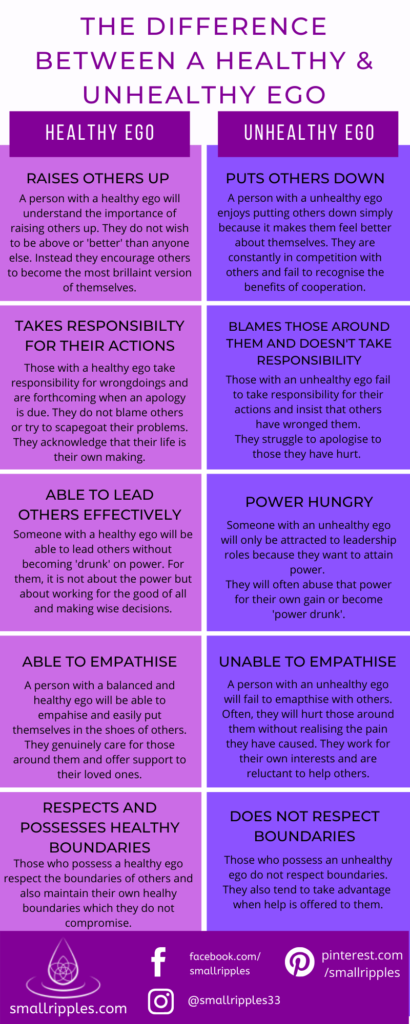You often find in spiritual books that many teachers warn against the dangers of the ego, portraying it as a stumbling block to spiritual evolution.
To many who are just starting their journey on the spiritual path, it would seem that the ego is something to be feared, stamped out and pushed away at all costs.
Maybe this is because the term ego has become synonymous with negative characteristics such as self-importance, pride and arrogance. Friedrich Nietzsche said, “Whenever I climb, I am followed by a dog called ‘Ego’”. And, of course, as Nietzsche implied, the ego can easily take us down a more negative self-serving route, if we don’t balance the ego with qualities such as empathy, compassion, and love.
However, rather than completely condemn the ego as our spiritual enemy; maybe we should consider it has a place in our spiritual awakening and evolution. Perhaps we should be working with it, rather than trying to push it away?
We cannot hide from our ego. It is always there and as much as we think we have escaped the ‘ego trap’, as many call it, the ego never actually leaves us. This is because it is a part of our identity and relates to the part of ourselves that we call ‘I’ or ‘me’.
What I would like to propose, is rather than trying to escape this aspect of ourselves, which is
An ego that assists and works with us on our spiritual path, rather than hindering us. An ego that helps us to channel that higher and more divine part of ourselves, allowing it to be anchored into the physical realm.
Some of you reading this might be thinking: how can the ego possibly be a positive thing? How can it assist me in my spiritual path? The answer here lies in whether you possess a healthy or unhealthy ego but first let me explain a little bit about what the ego actually is.
Contents
What is the Ego?
The term ego was popularised by the very famous psychoanalyst Sigmund Freud, and refers to the part of yourself that you
Gregg Henrique in Psychology Today describes the ego as a “self-consciousness system”. He explains:
“A more modern conception that is certainly related to Freud’s is to consider the ego as the self-consciousness system. The self-consciousness system is the narrating portion of human consciousness that reflects on one’s thoughts, feelings and actions and inhibits or legitimizes them to one’s self and to others. In this sense, ego is very similar to what is meant by the term identity.”
Similarly, if we look at the definitions that Vocabulary.com offer, we are presented with two understandings of what the ego is:
“1. An inflated feeling of pride in your superiority to others.
2. Your consciousness of your own identity.”
So it seems that there are two ways of looking at the ego: one, that it is the seat of all feelings of pride, arrogance and selfishness and two, that it is rather an apparatus for defining our idea of self.
So why do we always perceive the ego as being purely a negative thing if, in terms of psychology, it is just an awareness of self? I am not sure exactly what the answer is to this but I do believe it has something to do with separating our own personal endeavours from what we do for other people, categorising service to self as ego and service to others as a step closer to oneness and the true spiritual path.
Eckhart Tolle demonstrates this idea well in what he says about the ego:
“One way to think about ego is as a protective heavy shell, such as the kind some animals have, like a big beetle. This protective shell works like armor to cut you off from other people and the outside world. What I mean by shell is a sense of separation: Here’s me and there’s the rest of the universe and other people. The ego likes to emphasize the “otherness” of others.”
This is true on many levels and especially true for individuals who possess an ego that is out of balance but I feel that Eckhart is missing something here. This is what the ego does in its most unhealthy and inharmonious state.
If we can develop a healthy ego that works in harmony with the softer more loving aspects of our being then these unhealthy or negative traits of the ego can be managed and brought back into balance.
This might seem like a difficult goal to achieve, particularly with how persistent the negative traits of our ego can be but all it really takes is awareness of these issues and a willingness to work on them.
A New Understanding of Our Ego
The way I have come to see the ego is perhaps a little different to the way spiritual teachers see it. Whilst I recognise that the ego does have the tendency to put itself first, be competitive and judge others, I do believe it can play an important role in helping an individual to fulfill their divine purpose on this planet.
The reason I believe this is because the ego is not just the devil sitting on someone’s shoulder. It is the channel for that person’s own unique divine expression to come through. It is the cup that holds that person’s energy, identity, talents and skills which they are here to bless the world with. It is also a person’s understanding of themself and the driving force behind their actions, words and intentions.
In the spiritual world and community, it seems that we are all working towards trying to get closer to that state of oneness, which is our true nature (as the universe is oneness). As Ra says in the channeled book The Ra Material: The Law of One, “All things, all of life, all of the creation is part of one original thought.”
I myself have experienced this oneness from altered states of consciousness by consuming plant medicines during ceremonies and it was a beautiful experience. It was
Even though we originate from this beautiful state; I do not believe that we are here to move closer to this unified realm of oneness while on this plane of existence. I feel that we are here to shine brightly in our uniqueness, in our splendour and in our separateness, and then hold in our hearts the magic of this oneness from where we came.
I am sure there will come a time in our soul’s journey through the infinite planes of existence, which we travel to from lifetime to lifetime when the ego will no longer serve us. But for now, on this third-dimensional plane, the ego does have its place.
It seems that much of the spiritual literature out there is encouraging individuals to somehow become egoless. The ultimate spiritual goal would seem to be constantly living in a state of oneness and unconditional love. Perhaps one day on our soul’s journey this will be achievable but for now this goal is unrealistic, considering the nature of our world and the challenges we face on a daily basis.
These realisations came to me when I considered my own issues with my ego, or lack of it I should say. I have never been someone to put myself in the limelight or to really put myself out there in the world. I never felt comfortable with it as I had always been quite an introverted person.
I also worried that if I did put myself out there, I would be playing too much into my ego and that I might be regressing on my spiritual path. However, I realised that if I didn’t recognise my ego, identity, and talents that I had, and put myself out into the world, I wouldn’t really be fulfilling my divine purpose. I also realised that my ego was not an enemy but helped me to ground my true essence into this existence.
As I started to think about the message that I wanted to create for this blog and how I wanted to describe myself to my readers, this new understanding of myself came to me.
I knew who I was and was able to better understand the energy, skills and talents my spirit brought to this world. I realised I was a feminine spirit who brought the power of gentleness and love with her and that I was meant to write words that seeded this energy into the world.
In this sense, I realised cultivating an ego that was in harmony with my spiritual path would assist me in what I was here to do.
What is the Difference Between a Healthy and Unhealthy Ego?

At this point, you might be wondering what exactly a healthy ego looks like. A person with a healthy ego can best be defined as someone who has a good understanding of their individual role in this world, sets a positive example for others and puts their energy, essence and being out into the world without fear.
They might also display strong leadership skills by being able to work for the best interests of the collective or be a teacher and guide to others, imparting their wisdom with confidence and ease.
To demonstrate better the traits that I believe indicate a healthy or unhealthy ego I have created these two lists.
A person with a Healthy Ego might do these things or have these qualities:
- Have a good understanding of their purpose on this planet and they are carrying it out with love and faith.
- Their words, actions and intentions reflect love and they are actively creating a positive impact in the world.
- Understand the necessity of looking after their own critical needs before looking after the needs of others.
- Have healthy boundaries which they do not compromise.
- Does not belittle themselves and confidently puts themselves out into the world.
- Practises self-love.
- Works to raise others up as well as themselves and works to harmonise competition.
- Is aware of the more negative aspects of their ego and finds ways to curb unhealthy egotistical habits.
- Is forgiving of themselves and accepts the presence of their ego.
- Listens to others and accepts responsibility for wrongdoings and is forthcoming when an apology is due.
- Acts with integrity.
- Is able to lead others in an honourable way and does not misuse their leadership role.
- Teaches and guides others when they can.
A person with an Unhealthy Ego might do or have these qualities:
- Put others down to make themselves feel better.
- Wants to be more important, clever, better looking, etc., than others.
- Does not take responsibility for wrongdoing and constantly blames others in conflict.
- Is concerned with only making themselves happy and does very little for others.
- Unable to identify unhealthy egotistical habits and work on them.
- Engages in unhealthy competition.
- Is unable to empathise with others.
- Behaves disrespectfully towards others and interrupts
conversation . - Constantly disagrees with others and asserts their own opinion in a forceful manner.
- Dishonest and sometimes engages in unethical activities.

How Can We Curb Unhealthy Habits of the Ego and Develop a Healthy Ego?
I believe the best way anyone can build a healthy ego, is to look inwards and be completely honest with yourself. Practice some introspection and identify exactly which habits of your ego are unhealthy.
You might notice that you have a bad tendency to judge others, feel competitive or sometimes lack listening skills or patience. Whatever those habits are, believe that you have the ability to heal them and bring yourself more into alignment with what is best for you and for the people around you.
Working on the aspects of our shadow self is what real spiritual devopment is about and if you are able to harmonise unhealthy egotistical traits, then you are doing a really good job.
The first step is to acknowledge these habits and tendencies and bring them to light. The second step is to, rather than punish yourself when these thoughts arise in your mind, draw your attention to these thoughts and behaviour. Ask yourself why do you feel this way? What caused you to have these thoughts or behave in that way?
Try to get to the root of the problem and see how best you can heal that issue. This might be a difficult journey of healing and inner work but in the long run, if it means that you can be more productive and positive in life as well as become more caring and helpful to those around you, it will definitely be worth it.
One important point to mention is that in no way am I advocating suppressing thoughts and feelings and trying to be happy and positive all the time. In the spiritual community, you will often find there is a common misconception about positive thinking. Many believe that to make any real spiritual progress you have to focus on positive thinking all the time.
This is not realistic and if you are doing real spiritual inner work, then it is most likely you are not going to be happy all of the time.
In fact, a big part of developing a healthy ego is to accept that you don’t have everything together all the time and recognise negative thought forms and patterns. As I mentioned before in my list of healthy ego traits, forgiveness and acceptance of this shadow side of your ego is an important step to building an ego that works in alignment with yourself and others.
You Are an Aspect of the Divine Creator

Trying to understand the ego and drawing a line between behaviour that represents a healthy or unhealthy ego can be tricky. Most spiritual teachers portray it as something that draws you in under the pretence of being your friend or guide but is really attempting to divert you from your spiritual path. To them, the ego is self-serving and is only concerned with survival in whatever form that may come in.
Whilst there may be some truth in this, I do not believe that we have an ego that is so persistent and unwavering, to send us completely in the other direction to spiritual growth. Yes, it stretches and pushes against our growth at times but it is not a brick wall. When we stop fighting against the ego and try to see what it is telling us, then we can work with it to create real positive change in this world.
In my opinion, the most crucial step to developing a healthy ego is remembering that it holds your sense of self and identity. Your identity, personality and total being is a representation and aspect of the Divine Creator, therefore on some level, so is your ego.
There is a purpose to having a part of yourself that says ‘I’ and separates you from all others. It is not the permanent part of yourself but it is the necessary part that will help you accomplish what you came here to do.
Your ego may challenge you and test you at times but if you are able to bring it back into balance, ultimately it can be your friend. And, of course, that permanent part of your being – the oneness from which we all originated – will always be right there in your heart, ready for you to tap into whenever you need.
